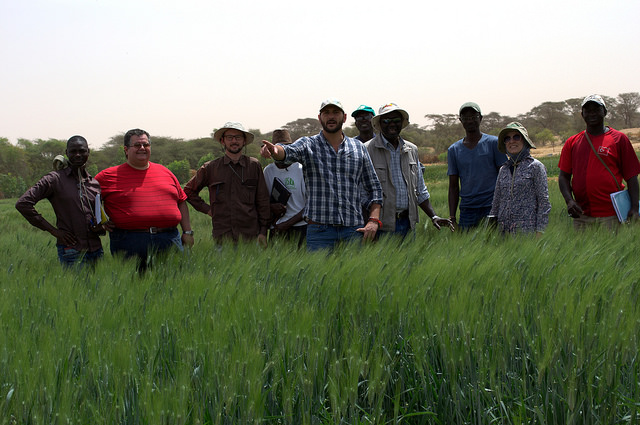15 January 2018. "A 'crazy idea' has resulted in the ability to grow durum wheat in the extreme heat of famine-affected Senegal, Mauritania and Mali, potentially boosting the income for 1 million farming families." This is the statement that explains the choice of the winner of the 2017 Olam Prize for Innovation in Food Security.
In this region, farmers grow rice for 8 months a year, while the land remains unproductive for the other 4 months. The new durum varieties have been developed to grow very fast and to tolerate high temperatures, allowing farmers to grow durum wheat between rice seasons. In this way 600,000 tonnes of new food could be produced, corresponding to 175 servings of pasta per person per year, in the region, which would also generate significant extra incomes for the farmers. As the wheat contains 5 times more protein than rice, as well as vitamins and minerals, it will also help to improve diets.
The basic research that made these achievements possible was done within a project that was led by Professor Rodomiro Ortiz at SLU in Alnarp and financed by the Swedish Research Council.
The actual plant breeding work was led by Rodomiro Ortiz and Filippo Bassi (International Center for Agricultural Research in the Dry Areas), and conducted in cooperation with research institutes in Mauritania (CNARADA), Senegal (ISRA) and Morocco (Mohammed V University). The germplasm will be shared freely with developing countries, which means that the discovery also has wide adaptation potential for other areas hit by increasing temperatures.
See also: Interview with Dr Filippo Bassi of ICARDA and Olam Prize for Innovation in Food Security Winner
The 2017 Olam Prize Winner for Innovation in Food Security was featured on a panel at the 8th International BCFN Forum on Food and Nutrition on the 4th of December in Milan, Italy. The Prize is run in partnership with the international scientific organisation, Agropolis Fondation and the winner receives an unrestricted US$50,000 grant for the scaling up of research. Watch an animation explaining the 2017 winner’s research.
The basic research that made these achievements possible was done within a project that was led by Professor Rodomiro Ortiz at SLU in Alnarp and financed by the Swedish Research Council.
The actual plant breeding work was led by Rodomiro Ortiz and Filippo Bassi (International Center for Agricultural Research in the Dry Areas), and conducted in cooperation with research institutes in Mauritania (CNARADA), Senegal (ISRA) and Morocco (Mohammed V University). The germplasm will be shared freely with developing countries, which means that the discovery also has wide adaptation potential for other areas hit by increasing temperatures.
See also: Interview with Dr Filippo Bassi of ICARDA and Olam Prize for Innovation in Food Security Winner
The 2017 Olam Prize Winner for Innovation in Food Security was featured on a panel at the 8th International BCFN Forum on Food and Nutrition on the 4th of December in Milan, Italy. The Prize is run in partnership with the international scientific organisation, Agropolis Fondation and the winner receives an unrestricted US$50,000 grant for the scaling up of research. Watch an animation explaining the 2017 winner’s research.


No comments:
Post a Comment